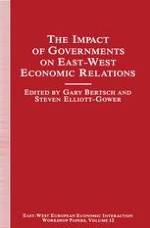1991 | Buch
The Impact of Governments on East-West Economic Relations
herausgegeben von: Gary Bertsch, Steven Elliott-Gower
Verlag: Palgrave Macmillan UK
Buchreihe : Vienna Institute for Comparative Economic Studies
Enthalten in: Professional Book Archive
